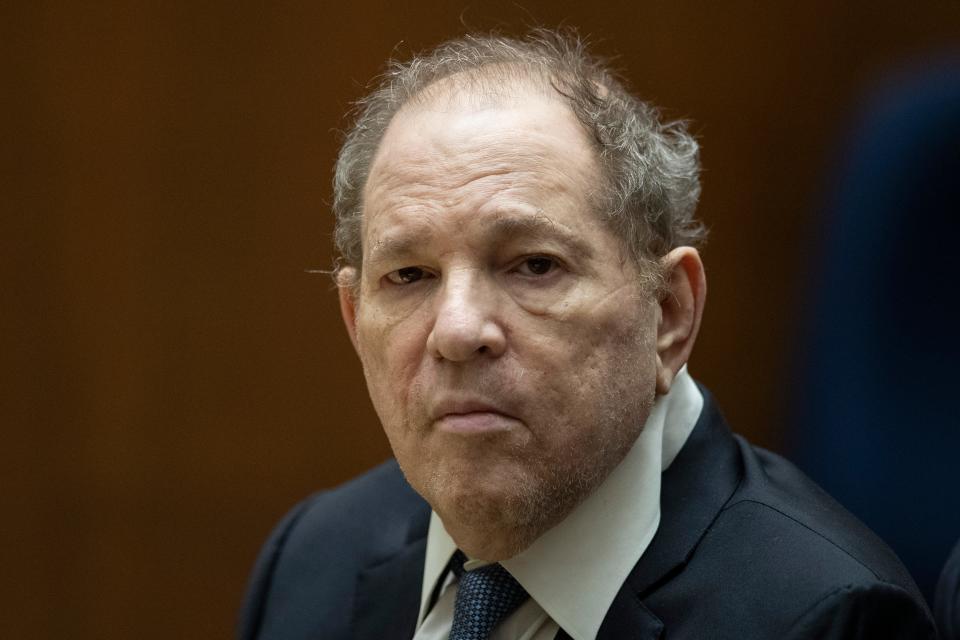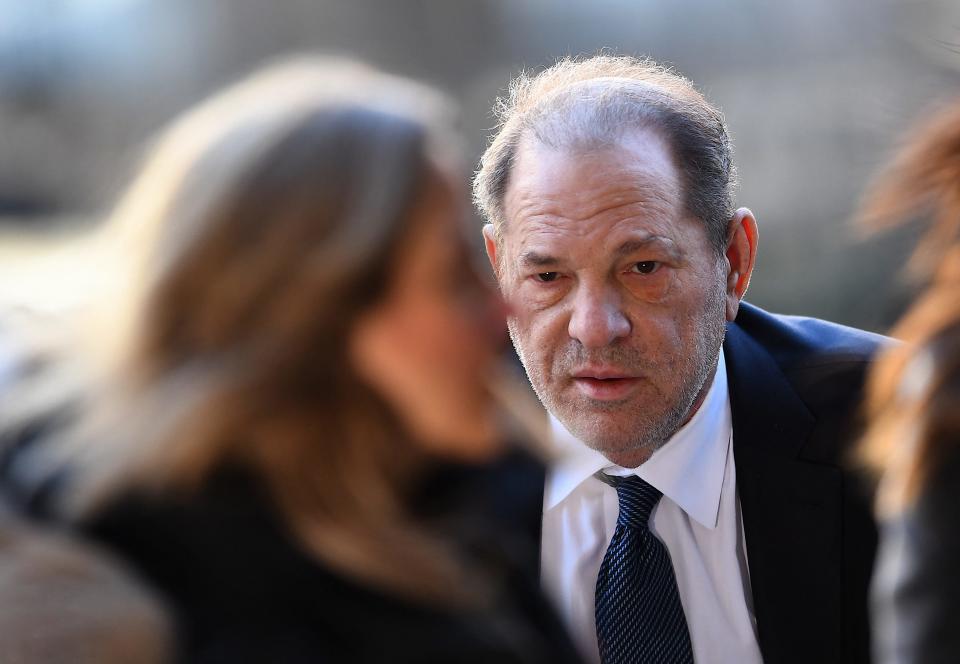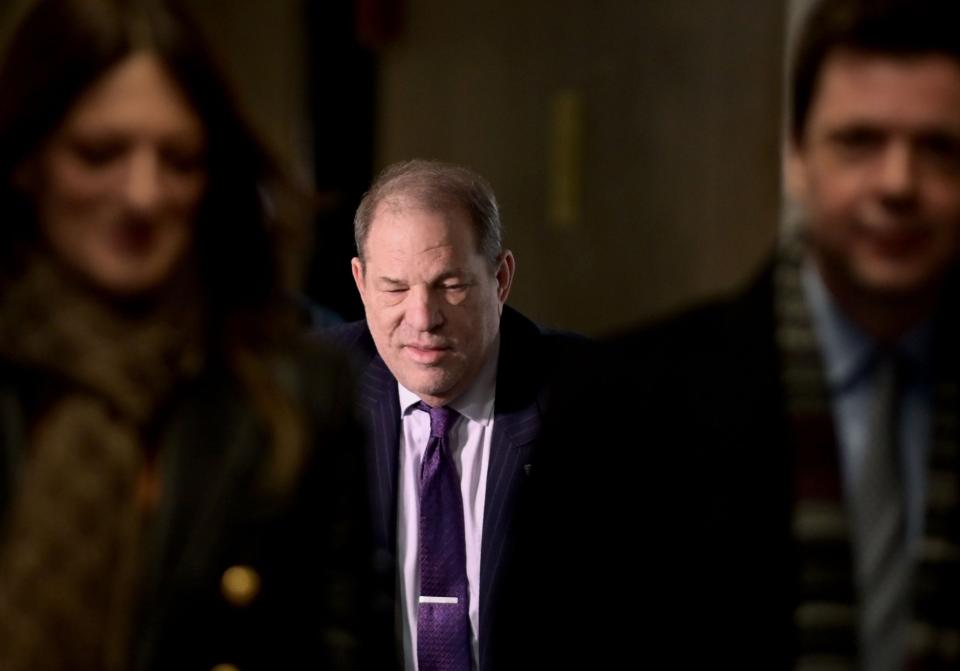Harvey Weinstein's rape conviction overturned by New York appeals court
NEW YORK — A New York appeals court has overturned embattled Hollywood producer Harvey Weinstein's 2020 rape conviction, after finding that the judge for the trial handed down improper rulings.
The case, which helped galvanize the #MeToo movement and spurred a reckoning in the entertainment industry, was part of a wave of allegations against the 72-year-old movie mogul.
“There are some people who are very unpopular in our society, but we still have to apply the law fairly to them,” Weinstein’s attorney Arthur Aidala said during a press conference after the decision. “And in this courthouse behind us at that trial, the law was not applied fairly to Harvey Weinstein.”
A weekslong, landmark 2020 trial resulted in Weinstein's rape conviction, and a judge sentenced him to 23 years in prison. In Thursday's 4-3 decision, the New York court ordered a new trial for Weinstein, who will continue serving a 16-year prison sentence stemming from a 2022 California conviction for rape.
"We will do everything in our power to retry this case and remain steadfast in our commitment to survivors of sexual assault," Emily Tuttle, a spokesperson for Manhattan District Attorney Alvin Bragg, told Reuters in an email.
USA TODAY has reached out to Weinstein's reps for comment.
Bombshell reports in 2017 detailed allegations from dozens of women of rape and sexual assault at the hands of Weinstein, prompting others to break their silence with allegations against similarly powerful men and igniting the #MeToo movement. Weinstein has repeatedly maintained his innocence and denied all allegations of non-consensual sex.

Harvey Weinstein judge in case admitted 'irrelevant,' 'untested' testimony, court says
The New York appeals court said in a written opinion Thursday that the judge in Weinstein's 2020 case, James Burke, admitted testimony from women with allegations that were not a part of the case ? known as Molineux witnesses ? but rather "irrelevant, prejudicial, and untested allegations of prior bad acts."
This "error" was exacerbated when the judge ruled that the former Hollywood producer could be cross-examined regarding these allegations and others, which depicted Weinstein in a "prejudicial light."
"Under our system of justice, the accused has a right to be held to account only for the crime charged and, thus, allegations of prior bad acts may not be admitted against them for the sole purpose of establishing" a tendency for criminal acts, the court's majority opinion states.
The opinion continues: "... It is an abuse of judicial discretion to permit untested allegations of nothing more than bad behavior that destroys a defendant's character but sheds no light on their credibility as related to the criminal charges lodged against them."
The court, however, rejected Weinstein's claim that his third-degree rape prosecution was time-barred, ruling that he could be retried on this count.
Harvey Weinstein timeline: The movie mogul's legal battles before NY conviction overturned

Harvey Weinstein conviction overturn is 'whitewashing the facts,' dissenting opinion states
In their biting opinion, three dissenting judges called the overturn of Weinstein's conviction a "whitewashing of the facts" to fit a "he-said/she-said narrative."
"Fundamental misunderstandings of sexual violence perpetrated by men known to, and with significant power over, the women they victimize are on full display in the majority's opinion," the judges state.
"... By ignoring evidence of defendant's manipulation and premeditation, which clouded issues of intent, and by failing to recognize that the jury was entitled to consider (Weinstein's) previous assaults, this Court has continued a disturbing trend of overturning juries' guilty verdicts in cases involving sexual violence," they continued.

Weinstein legal team holds press conference following overturned conviction
During a press conference in New York Thursday afternoon, Weinstein’s legal team said he was the victim of a popularity contest amid a #MeToo movement that placed Weinstein at its center that led to his conviction.
The legal team stood across the street from Manhattan Criminal Court, where former President Donald Trump currently has a trial for hush money payments to former adult film star Stormy Daniels. Weinstein would take the stand to defend himself if another trial occurs for Mimi Haley, his attorney said.
“I don't care who the defendant is,” attorney Arthur Aidala said. “If it's a former president of the United States or the most so storied Hollywood producer of our generation, the law applies to everyone.”
Harvey Weinstein 'grateful' after overturned conviction, attorney says
Aidala said he spoke to Weinstein Thursday morning, who was grateful and maintained his innocence.
"He just said thank you more times than I can count," Aidala said. "He's in a horrible place, a horrible situation, but the human spirit is strong and he's done the best he can."
Weinstein will be brought back from Mohawk Correctional Facility in upstate New York and housed in a holding facility in New York City, his representative Juda Engelmayer said in an email to USA TODAY. He also faces his sentence in California.
Accusers Ashley Judd, Jennifer Siebel Newsom speak out
Actress Ashley Judd, one of Weinstein's accusers, condemned the overturning of Weinstein's conviction in a statement to reporters.
"This today is an act of institutional betrayal," Judd said.
Jennifer Siebel Newsom, wife of California governor Gavin Newsom and one of Weinstein's accusers in his Los Angeles case, called the overturning a "very sad day for countless women who suffered at the hands of a serial predator."
"Two juries have said unequivocally: Harvey Weinstein must never be able to rape another woman, and he deserves to spend the rest of his life behind bars," Newsom said. "Most men are good men. It’s the serial perpetrators of violence against women who are the harm to our society."
'Absolutely devastated': Harvey Weinstein accusers react to rape conviction overturning
Lawyer for accusers decries overturning
A lawyer for eight Weinstein accusers, including two of the Molineux witnesses at the New York criminal trial, spoke out about the decision, calling it a "major step back."
"Today's decision is a major step back in holding those accountable for acts of sexual violence," attorney Douglas H. Wigdor said in a statement to USA TODAY Thursday.
"Courts routinely admit evidence of other uncharged acts where they assist juries in understanding issues concerning the intent, modus operandi or scheme of the defendant. The jury was instructed on the relevance of this testimony and overturning the verdict is tragic in that it will require the victims to endure yet another trial," Wigdor concluded.
Harvey Weinstein case: What happened in his New York trial with Jessica Mann, Miriam Haleyi
Weinstein was convicted of criminal sexual act in the first degree and rape in the third degree in February 2020 after a trial in which six of his accusers provided testimony. He was not convicted on additional charges of predatory sexual assault and rape in the first degree. The disgraced producer, who pleaded not guilty, was sentenced to 23 years in prison.
Weinstein's conviction in New York stemmed from the accusations brought by Miriam "Mimi" Haleyi and Jessica Mann. Mann alleged that Weinstein raped her in a hotel room in 2013, and Haleyi alleged he forcibly performed oral sex on her in 2006 at his apartment. "Every time I tried to get off the bed, he would push me back and hold me down," Haleyi testified. But additional accusers also testified about their allegations of sexual misconduct against Weinstein during his trial.
What are Molineux witnesses? New York appeal decision could end use
Molineux witnesses are intended to establish a pattern of bad acts.
Weinstein's attorneys took issue with these witnesses being allowed to testify in his trial when he was not charged in connection with their allegations. In 2022, a state appellate court upheld his conviction, concluding that his trial was fair, but New York's Court of Appeals later agreed to hear the case.
In the New York appellant court's dissenting opinion, the judges said the majority opinion's ruling could lead to Molineux witnesses no longer being used.
"The Molineux rule — created by this Court — has never been static. Instead, its use has evolved over time to meet the challenges of complex criminal prosecutions," the opinion states. "Unfortunately, in the context of sexual assault, that evolution lapses today with a decision that has all but ended the use of Molineux evidence in such cases."
Harvey Weinstein California conviction resulted in prison sentence
Weinstein's New York conviction being overturned does not mean he is legally in the clear.
Separately, Weinstein was also convicted of rape and sexual assault in Los Angeles in 2022 while he was serving time in New York. That conviction stemmed from rape allegations brought by a woman identified as Jane Doe 1. In 2023, he was sentenced to an additional 16 years in prison on those charges.
What does Harvey Weinstein's case overturn mean for his California conviction?
Where is Harvey Weinstein now?
Weinstein is currently housed at the Mohawk Correctional Facility in Rome, New York. He returned to New York last year after having been extradited to California to face charges there, according to The Associated Press.
Who is Harvey Weinstein? Disgraced movie producer has faced dozens of sexual misconduct allegations
Before being accused of sexual misconduct by dozens of women, Weinstein was among the most powerful producers in the entertainment industry for much of the 1990s and 2000s.
He and his brother, Bob Weinstein, co-founded Miramax, which distributed a string of acclaimed films like "Pulp Fiction" and "Shakespeare in Love"; the latter won the Academy Award for best picture in 1999. Weinstein is widely credited with popularizing aggressive Oscar campaign tactics, changing the way that film studios pushed their films for awards recognition, and his name was one of the most frequent to be mentioned in Oscar acceptance speeches for many years. In 2005, Weinstein and his brother Bob founded The Weinstein Company, which distributed movies like "Silver Linings Playbook" and "Django Unchained."
But in October 2017, Weinstein's film empire came crashing down when The New York Times and the New Yorker published bombshell reports with detailed accounts of sexual assault and rape. The following year, The Weinstein Company filed for bankruptcy. A film about The New York Times' investigation into Weinstein, "She Said," was released in 2022.
Contributing: Maria Puente, Naledi Ushe, Patrick Ryan, Brendan Morrow and Eduardo Cuevas, USA TODAY; Jonathan Stempel and Brendan Pierson, Reuters
This article originally appeared on USA TODAY: Harvey Weinstein: Overturned conviction by NY appeals court
